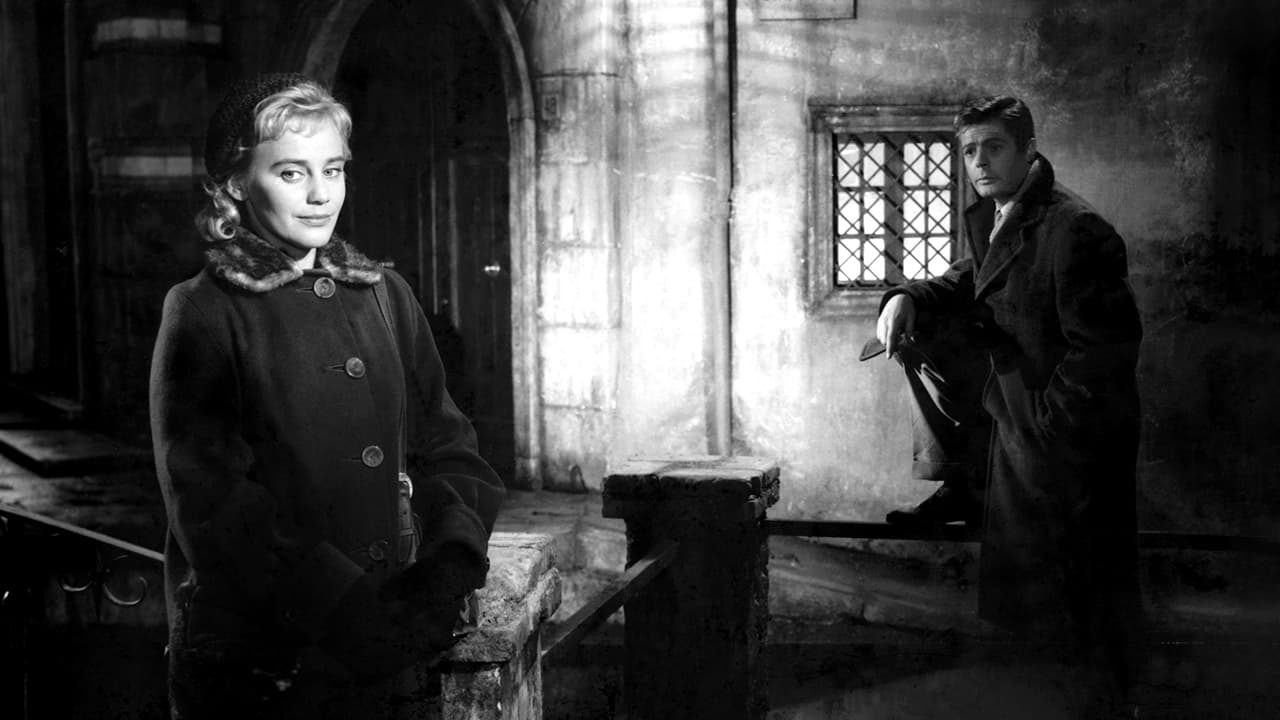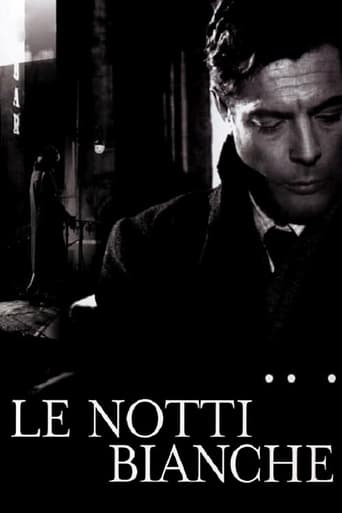

Who payed the critics
... View MoreWatch something else. There are very few redeeming qualities to this film.
... View MoreThis is a must-see and one of the best documentaries - and films - of this year.
... View MoreEasily the biggest piece of Right wing non sense propaganda I ever saw.
... View MoreIn a cold night, the lonely ordinary man Mario (Marcello Mastroianni) is wandering along the empty streets of Livorno after spending the day with the family of his employer. While crossing a bridge, Mario sees a beautiful woman crying and he starts a conversation with her. The reluctant Natalia (Maria Schell) finally accepts his companion to walk her home and they schedule to meet each other on the next day at the same place at 10:00 PM. The romantic and naive Natalia tells Mario that she is Slav and lives with her grandmother. They survive repairing fancy carpets and renting a room in their house. When an unknown tenant (Jean Marais) rents the room, Natalia immediately falls in love with him. However, the man asks for one year apart to raise enough money to get married with her and promising to return and meet her on the bridge where Mario met her in the previous night. She gives a letter to Mario to deliver to the stranger but Mario throws it away in the canal. On the next night, Natalia meets Mario by chance and they spend the snowing night together, dancing, chatting and drinking, and Mario falls in love with her; but while walking back home, the couple sees a man alone on the bridge."Le Notti Bianche" is one of the most beautiful romances I have ever seen. The melancholic, utopist and timeless love story is a different film from the genius Luchino Visconti, based on the novel by Fyodor Dostoyevsky, and was shot in magnificent sets that rebuilt a non- faithful quarter of Livorno in the Cinecittá in the opposite direction of the Italian Neo-Realism. The chemistry between Marcello Mastroianni in one of his best roles and the gorgeous and sweet Maria Schell with her delightful smile in the role of a dreamer is amazing and one of the greatest attractions of this lovely film. The haunting cinematography in black and white is comparable to the German Expressionism with the use of lighting and shadows. Last but not the least, the unforgettable music score of Nino Rota completes this stunning and unknown masterpiece. The DVD released in Brazil by Versátil Dstributor has restored images and perfect sound that highlight the wonderful cinematography. My vote is ten.Title (Brazil): "Noites Brancas" ("White Nights")
... View MoreMario (Marcello Mastroianni) is a introverted young man who is new in town (a fantastical Livorno created just for the film). He encounters a young woman Natalya (Maria Schell) who appears to be waiting on a bridge. He saves her from some hoodlums and they become acquaintances. Over the next 4 nights we hear the stories of Mario and Natalya and come to learn why Natalya waits day after day at the bridge. Mario falls completely in love with Natalya and (in a departure from the Dostoyevsky story) throws away the letter she asks him to deliver to her returned lover. Will Natalya reciprocate Mario's feelings for her or will she forever pine for her lost love? The familiar tale unfolds beautifully in Visconti's version and the combination of sets, haunting use of lighting and fog, the river, the rain and snow, the narrow streets makes this a treat for the senses.The lead pair acted very well - Marcello was a heart-throb and Maria was beautifully vulnerable. Jean Marais as the tenant was a complete contrast to Mario the dreamer. He was earthy and big and solid.The movie had many beautiful moments but I MUST mention the night club scene - Marcello's dance was an inspired mix of gauche and genius. This is a beautiful film, well worth a watch and a few repeats. The DVD has some great insights into the period and what went into making the film.
... View MoreLuchino Visconti's adaptation of Fyodor Dostoyevsky's classic novel fits in perfectly with post-WWII Italy. Marcello Mastroianni and Maria Schell play people from dissimilar backgrounds who meet one night in an Italian town and strike up a relationship.An important aspect is their backgrounds. He has moved in from out of town, but has quickly gotten to know part of the town. While she has lived in the town her whole life, her grandmother has kept her close and never allowed her to see the other side of the town; she earlier struck up a relationship with another man (Jean Marais), but he left and she doesn't know whether or not he'll return. So then, Marcello Mastroianni and Maria Schell meet on the bridge (the link not only between the two sides of the town, but between the characters' different worlds).Another representation of contrasts between the separate worlds is shown by the different types of music. In one scene, Maria Schell and her grandmother go to see "Barber of Seville", one of the all-time classic operas. In the restaurant scene, someone plays a Bill Haley song, emblematic of modern music. Luchino Visconti was no fan of rock and roll, but probably felt that it would make for an evocative scene in this case.But anyway, "Le notti bianche" (or "White Nights") remains an important part of Italy's cinematic history. I hope to see more of Visconti's movie's in the future.
... View MoreYou know, I'm really surprised that I didn't like this movie. It's major theme about the difference in reality and fantasy, along with its stunningly beautiful black and white cinematography, is precisely the sort of thing I look for in film. And yet, I didn't ultimately find it very enjoyable.It's a very smart and well-written movie. The ways in which the character's aspirations and yearning mix with the reality of the situation is very precise and real, speaking both to the original writer of the short story, Dostoyevsky (whose writing resembles the quiet brooding of the male protagonist in many ways) and Visconti's own skill with directing and camera work. In fact, the very self-aware staging of the movie is what makes it easily a majestic cinematic experience, one that really shouldn't be missed. This movie could be watched and easily stay interesting just paying attention to the lighting of the shots and the composition of the frames.Indeed, for a film surrounded in all sorts of romance and yearning, it's very detached, often, from the characters. Close-ups are almost nonexistent and for the most part the camera seems most happy to stay far away, with faces barely recognizable within the mist.It's everything a film goer would love, which is why I find it odd that I didn't much care for the characters. The male protagonist I can understand, and even sympathize with, even as far as his attraction to the female. She, however, is too out of it, completely unreal, almost an idealized notion of something everybody's ideal would be to avoid. In short, I couldn't stand her, or watching her, or anything she did.There were two very strong moments in the film that, for me, made it worth the time spending to see. The first is the dancing scene, where Marcello Mastrianni lets go and changes from the shy but humble courter to one of those virile, energetic youngsters, showing off and mugging. The other is the very end... of which I won't describe for spoiler purposes, but which ultimately makes Mastrianni's character someone we can all relate to.Thus, I can honestly say that this film is magnificent, and that many people should go out and watch it. It's beautiful, contains strong acting and directing, has some very poignant scenes, and has a remarkable control over mise-en-scene. I just really don't like it.--PolarisDiB
... View More